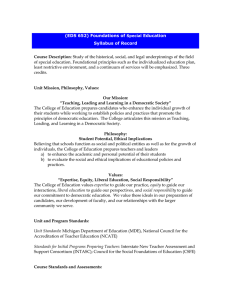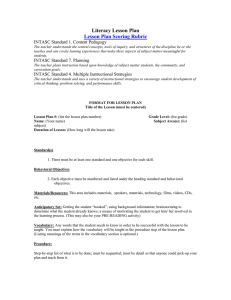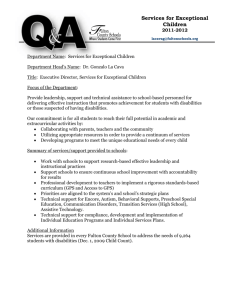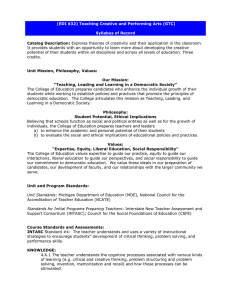(EDS 652) Foundations of Education Syllabus of Record
advertisement
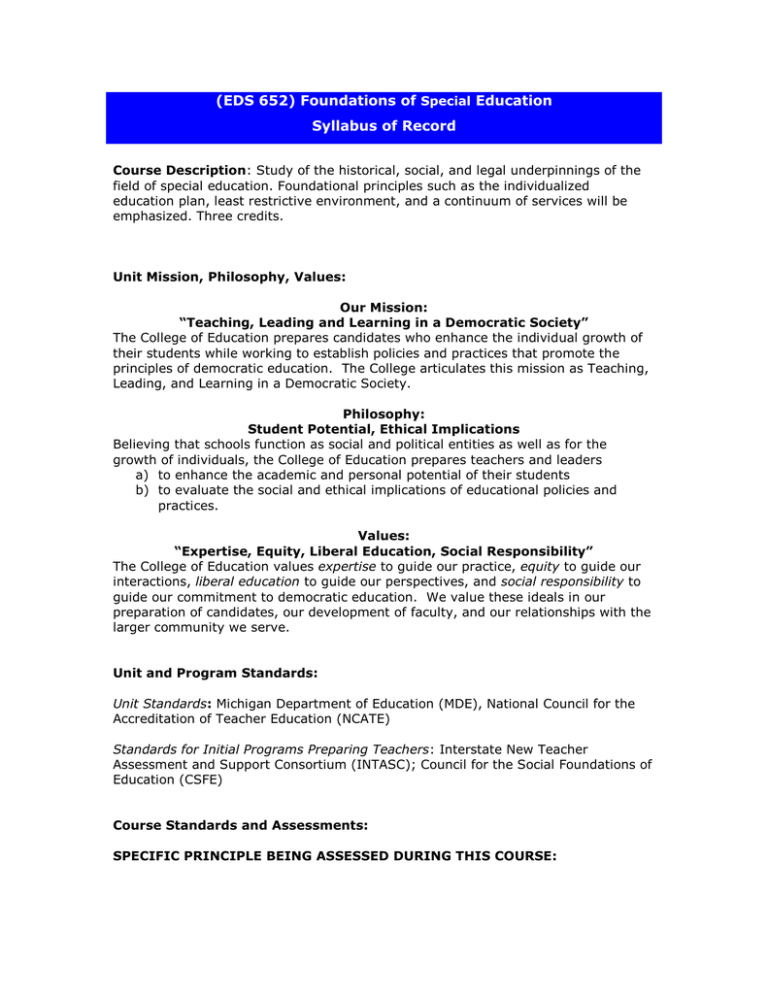
(EDS 652) Foundations of Special Education Syllabus of Record Course Description: Study of the historical, social, and legal underpinnings of the field of special education. Foundational principles such as the individualized education plan, least restrictive environment, and a continuum of services will be emphasized. Three credits. Unit Mission, Philosophy, Values: Our Mission: “Teaching, Leading and Learning in a Democratic Society” The College of Education prepares candidates who enhance the individual growth of their students while working to establish policies and practices that promote the principles of democratic education. The College articulates this mission as Teaching, Leading, and Learning in a Democratic Society. Philosophy: Student Potential, Ethical Implications Believing that schools function as social and political entities as well as for the growth of individuals, the College of Education prepares teachers and leaders a) to enhance the academic and personal potential of their students b) to evaluate the social and ethical implications of educational policies and practices. Values: “Expertise, Equity, Liberal Education, Social Responsibility” The College of Education values expertise to guide our practice, equity to guide our interactions, liberal education to guide our perspectives, and social responsibility to guide our commitment to democratic education. We value these ideals in our preparation of candidates, our development of faculty, and our relationships with the larger community we serve. Unit and Program Standards: Unit Standards: Michigan Department of Education (MDE), National Council for the Accreditation of Teacher Education (NCATE) Standards for Initial Programs Preparing Teachers: Interstate New Teacher Assessment and Support Consortium (INTASC); Council for the Social Foundations of Education (CSFE) Course Standards and Assessments: SPECIFIC PRINCIPLE BEING ASSESSED DURING THIS COURSE: INTASC #3: KNOWLEDGE: INTASC #3.K.1 INTASC #3.K.2 The teacher understands how students differ in their approaches to learning and creates instructional opportunities that are adapted to diverse learners. Knowledge (K), Disposition (D), and Performance (P). The teacher understands and can identify differences in approaches to learning and performance, including different learning styles, multiple intelligences, and performance modes, and can design instruction that helps use students' strengths as the basis for growth. The teacher knows about areas of exceptionality in learningincluding learning disabilities, visual and perceptual difficulties, and special physical or mental challenges. PERFORMANCES: INTASC #3.P.1 The teacher identifies and designs instruction appropriate to students' stages of development, learning styles, strengths, and needs. INTASC #3.P.3 The teacher makes appropriate provisions (in terms of time and circumstances for work, tasks assigned, communication and response modes) for individual students who have particular learning differences or needs. INTASC #3.P.4 The teacher can identify when and how to access appropriate services or resources to meet exceptional learning needs. INTASC #3.P.7 The teacher creates a learning community in which individual differences are respected. NCATE Standard 1: Candidate Knowledge, Skills, and Professional Dispositions Standard 4: Diversity CEC • Standard 1: Foundations • Standard 9: Professional and Ethical Practice Common Assessment: Case Study Course Objectives • • • Students will understand the historical and social background of special education including the people, politics, and events that have shaped the field. Students will understand foundational laws, past and present, that have influenced and continue to influence special education. Students will have knowledge of the wide array of exceptionalities and the lifespan approach used for providing services to enhance the quality of life for individuals with exceptional learning needs. • • Students will have knowledge of the various service delivery models used in providing education to students with exceptional learning needs, available research regarding each model, and the roles and responsibilities of various educators within these models. Students will have skill in developing individualized education plans and individualized transition plans, and participating on a team that supports individuals with exceptional learning needs. Course Topics Topic HISTORICAL AND SOCIAL BACKGROUND OF SPECIAL EDUCATION • Compensatory Education • Advocacy Groups • Parents and Families • Disability Etiquette LEGAL • • • • ISSUES Education for all Handicapped Children Individuals with Disabilities Education Act Assessment & Identification Americans with Disabilities Act Class Time (Hours) 6 9 EXCEPTIONALITIES • Low Incidence Disabilities • High Incidence Disabilities 9 SERVICE DELIVERY MODELS • Self-Contained Classrooms • Resource Room • Co-Teaching and Collaboration • Specialized Facilities 9 TEACHER PARTICIPATION • Individualized Education/Transition Planning • Self-Advocacy • Provision of Accommodations and Modifications • Universal Design 12 Course Textbooks Turnbull, A. P., Turnbull, R., Shank, M., & Smith, S. J. (2003). Exceptional Lives: Special Education in Today’s Schools. Fourth Edition. Prentice Hall: Columbus, Ohio. Additional pertinent readings from journals will be assigned. Course Requirements Quizzes (15 points each / 60 points total) – Every three weeks a quiz on course content will be administered. These quizzes will assess students’ knowledge of content taught in the course and students’ application of the content taught. Final Exam (50 points total) – The final exam will cover content from the entire course. The test will have two parts. Part one will assess students’ knowledge of content taught in the course. Part two will assess students’ application of content taught in the course. IEP/ITP (45 points total) – A case study report will be provided to small groups. Based on the case study, each group will develop an IEP/ITP. Unit of Instruction (70 points total) – Each student will adapt a unit of instruction in order to meet the needs of specific individuals with exceptional learning needs. Course Grading Scale Grade A AB+ B B- Total Points 225-216 215-207 206-198 197-189 188-180 Percentage Grade 96% 92% 88% 84% 80% C+ C CF Total Points 179-171 170-162 161-153 152 - 0 Percentage 76% 72% 68%
